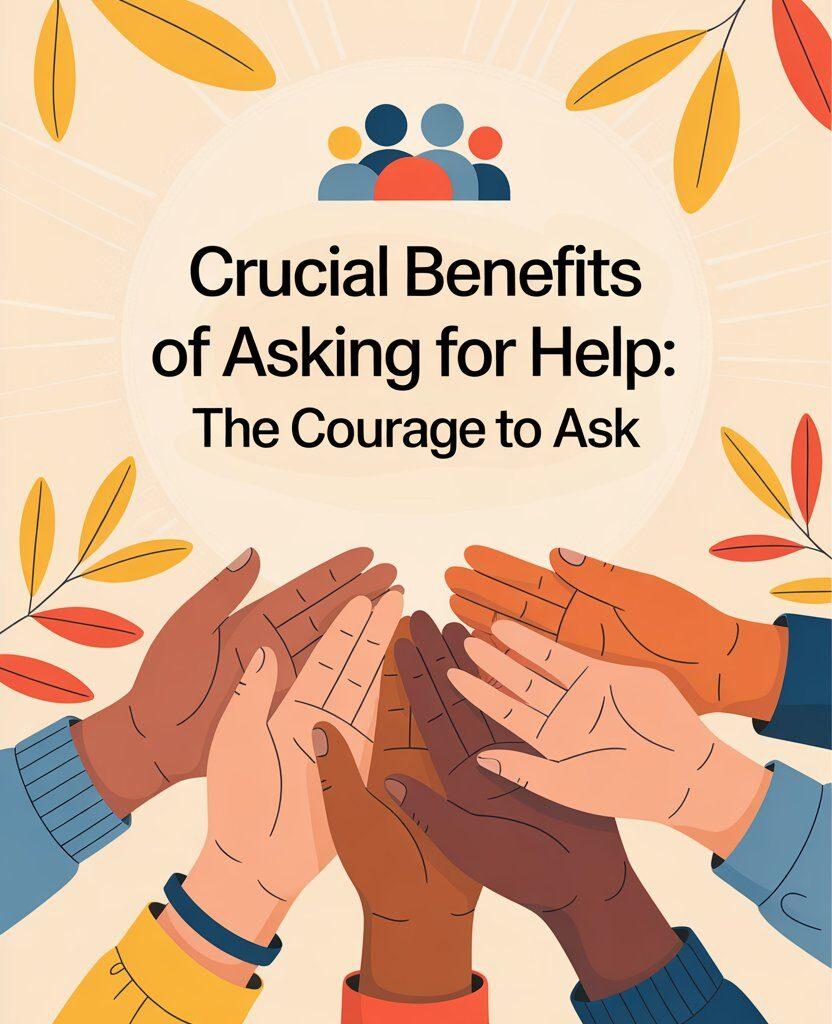Disclaimer: This post may contain affiliate links, meaning we get a small commission if you make a purchase through our link at no extra cost to you. For more information, please visit our Disclaimer Page.
Let’s be honest—asking for help can feel like trying to climb a mountain in flip-flops. Uncomfortable, awkward, and sometimes downright scary.
But what if I told you that reaching out for support is actually one of the most courageous things you can do?
I know this firsthand because I’ve struggled with asking for help throughout my life.
Whether it was reaching out to friends, seeking guidance from parents, or requesting assistance from colleagues—fear of rejection often stopped me in my tracks.
Looking back, I missed opportunities to advance further in my career and personal growth simply because I couldn’t bring myself to ask for the support I needed.
My insecurities and lack of confidence kept me isolated when connection could have made all the difference.
So, let’s talk about why asking for help matters and how you can get better at it than I was.

Table of Contents
Why Is Asking for Help So Damn Hard?
Ever wondered why something that should be simple—just asking someone for assistance—can feel so impossible? You’re not alone. Here’s what’s really going on:
- The burden fear: “I don’t want to be a bother” is probably the most common reason people avoid asking for help. We worry we’re wasting others’ time or adding to their already full plates.
- Self-esteem struggles: When you don’t feel worthy, it’s hard to believe you deserve help. Low self-esteem whispers that you should handle everything alone.
- Pride gets in the way: Especially for men, there’s that stubborn voice saying asking for help shows weakness. (Spoiler: it absolutely doesn’t.)
- Past rejection: If you’ve reached out before and been shot down, those memories can make you gun-shy about trying again.
- The overgiving trap: Some of us are so used to being the helper that receiving feels wrong or uncomfortable. This isn’t genuine generosity—it’s a pattern where you give to feel validated.
- Victim mindset: Sometimes it feels safer to believe nothing can change than to take the risk of asking for support.
- Trust issues: When you’ve been let down before, it’s hard to believe others will come through for you.
- Codependency concerns: If your self-worth is tied to others’ opinions, asking for help can feel especially threatening.
The Psychology of Asking for Help
Dr. Brené Brown, renowned researcher on vulnerability and shame, explains that asking for help requires vulnerability, which many of us have been conditioned to avoid. We mistakenly equate vulnerability with weakness when it actually demonstrates tremendous courage.
This was a huge revelation for me. When I finally started learning to love myself enough to believe I deserved support, doors began to open that I never knew existed.
What Is the Fear of Asking for Help Called?
The fear of asking for help doesn’t have just one name, but it often manifests as:
- Autonomy anxiety: Fear of losing independence
- Rejection sensitivity: Intense fear of being turned down
- Dependency phobia: Worry about becoming reliant on others
- Helponophobia: A more general fear of receiving assistance
Understanding these psychological barriers is the first step to overcoming them.
Not Asking for Help Is a Trauma Response
Here’s something that blew my mind when I first learned it: chronic self-reliance can actually be a trauma response. When children grow up in environments where their needs aren’t consistently met, they often develop the belief that they can only count on themselves.
This coping mechanism might have protected you as a child, but as an adult, it can keep you isolated and overwhelmed. As trauma expert Dr. Gabor Maté describes, these adaptive behaviors that once helped us survive can later prevent us from thriving.
If you recognize this pattern in yourself, please know it’s not your fault—it was a brilliant survival strategy. But now you deserve to build new patterns that allow support into your life.
Why Is Asking for Help Important for Mental Health?
Your mental health takes a serious hit when you try to shoulder everything alone. Here’s why reaching out matters so much:
- Prevents isolation: Humans are social creatures. When we struggle alone, we cut ourselves off from a fundamental need for connection.
- Reduces overwhelming stress: Chronic stress from trying to manage everything solo can lead to anxiety, depression, and burnout.
- Creates psychological safety: Knowing you have people you can turn to creates a sense of security that’s crucial for mental wellbeing.
- Builds resilience: Contrary to popular belief, resilience isn’t about handling everything yourself—it’s about knowing when and how to tap into your support network.
- Challenges negative thought patterns: When others help you, it confronts those internal voices saying you’re unworthy or that nobody cares.
Research consistently shows that social support is a key protective factor against mental health challenges. By asking for help, you’re not just solving a problem—you’re actively improving your mental health.
Mental Benefits of Asking for Help
Beyond preventing problems, seeking support actively contributes to positive mental health in several ways:
1. Boosts Happiness and Connection
Sharing your struggles and receiving support reminds you that you’re cared for and not alone. This sense of connection is powerful medicine for the mind. It can:
- Trigger feelings of gratitude
- Strengthen your bonds with others
- Free up mental space to rediscover passions and interests
2. Fosters a Growth Mindset
Taking the step to ask for help demonstrates that you believe in your capacity to learn and evolve. People with a growth mindset see asking for help as a sensible step forward rather than a sign of inadequacy.
Stanford psychologist Carol Dweck’s research on mindset shows that this perspective leads to greater achievement and satisfaction.
3. Reduces Anxiety and Stress
The relief that comes from sharing your burden can be immediate and profound. When you’re no longer trying to handle everything solo:
- Your nervous system gets a chance to regulate
- You feel more centered and grounded
- Your confidence in facing challenges increases
I remember the weight that lifted from my shoulders when I finally asked a colleague for help with a project I was struggling with. Not only did the work improve, but I slept better that night than I had in weeks.
4. Contributes to Personal Growth

Asking for help pushes you out of your comfort zone and toward development. It helps you:
- Identify areas for improvement
- Acquire valuable life skills
- Enhance decision-making by clarifying your values
Benefits of Asking for Help in the Workplace
The professional environment presents unique challenges and opportunities when it comes to seeking assistance. Here’s why it matters at work:
1. Increases Productivity and Quality
Nobody is an expert at everything. Asking for help with tasks you struggle with can:
- Eliminate unnecessary steps and obstacles
- Help you progress faster on projects
- Lead to better overall results
For years, I tried to handle technical aspects of projects that weren’t my strength, and the results showed it. When I finally started collaborating with colleagues who had those skills, our collective work improved dramatically.
2. Demonstrates Leadership Qualities
Contrary to outdated beliefs, effective leaders regularly seek input. It shows:
- Self-awareness
- Commitment to excellence
- Confidence in your team’s abilities
3. Creates a Collaborative Culture
When you ask for help, you normalize the behavior for everyone else. This leads to:
- More innovation through shared knowledge
- Stronger team bonds
- Reduced burnout across the organization
4. Accelerates Learning and Development
Every time you seek assistance, you gain new insights and approaches that:
- Expand your skillset
- Increase your value to the organization
- Prepare you for advancement opportunities
Benefits of Asking for Help in a Relationship
Relationships thrive on mutual support and vulnerability. Here’s why asking for help strengthens your connections:
1. Builds Trust and Intimacy
Letting someone help you demonstrates trust in their capabilities and character. This vulnerability creates deeper bonds than surface-level interactions ever could.
2. Creates Healthier Dynamics
Becoming comfortable asking for help can transform relationships by:
- Allowing you to feel heard and valued
- Increasing the likelihood of having emotional needs met
- Breaking patterns of overgiving or codependency
3. Models Healthy Behavior
When you ask for help, you show your partner that it’s safe for them to do the same. According to relationship experts John and Julie Gottman, this reciprocity is essential for lasting love.
4. Prevents Resentment
Suffering in silence often leads to resentment when needs go unmet. Asking directly:
- Gives your partner the chance to show up for you
- Prevents mind-reading expectations
- Creates opportunities for mutual support
Looking back, I can see how many arguments with loved ones could have been avoided if I’d simply asked for help when I needed it, rather than expecting them to notice my struggle or harboring resentment when they didn’t.

How to Overcome Fear of Asking for Help
Now for the practical part—how do you actually get better at reaching out? Here are some strategies that have worked for me and others:
1. Start With Clear Communication
Be specific about what you need. Vague requests are harder to fulfill and more likely to lead to disappointment.
“I need help with this project” becomes much more effective when it’s “Could you review this presentation draft and give me feedback on the clarity of my main points by Thursday?”
2. Choose the Right Person
Not everyone is equipped to help with every problem. Consider:
- Who has relevant experience?
- Who has shown themselves to be trustworthy?
- Who has the capacity to help right now?
Matching your need to the right helper increases your chances of success.
3. Practice In-Person Requests When Possible
Your body language and facial expressions naturally convey sincerity and need.
If in-person feels too intimidating, try:
- Setting up a video call
- Arranging a meeting via text first
- Building up to bigger requests with small ones
4. Eliminate Apologetic Language
Phrases like “I hate to ask, but…” or “It’s just a small thing…” diminish your request before you’ve even made it. Instead, try:
- “I could really use your help with…”
- “I value your expertise on…”
- “Would you be willing to…”
This was a game-changer for me. When I stopped apologizing for having needs, people responded much more positively to my requests.
5. Express Genuine Gratitude
A sincere “thank you” goes a long way in making people feel appreciated. Acknowledging someone’s help:
- Makes them more likely to help again
- Strengthens your relationship
- Creates a positive cycle of support
Practicing gratitude regularly can help make this response more natural.
6. Start Small and Build
Like any skill, asking for help gets easier with practice. Begin with lower-stakes requests to build your confidence.
7. Write It Down First
If face-to-face requests feel overwhelming, try:
- Drafting an email or text
- Making a list of exactly what you need
- Practicing what you’ll say out loud
The act of writing often clarifies your thoughts and reduces anxiety.
The Gift of Helping Others
Interestingly, offering help can be just as beneficial as receiving it. When you help others, you:
- Increase your own sense of purpose and fulfillment
- Lower stress levels
- Potentially reduce health risks like heart attacks
- Build stronger community connections
Many people find that helping others contributes significantly to happiness. Small acts of kindness—checking in on a friend, offering to pick up groceries, or sharing your expertise—can mean the world to someone else while boosting your own wellbeing.
How to Ask for Help When You Need It
Ever felt overwhelmed but didn’t know how to ask for help? You’re not alone—it’s tough, but it doesn’t have to be.
- First, recognize the need. Acknowledge when things feel too much. There’s no shame in admitting you need support; it’s a sign of strength, not weakness.
- Next, get specific about what you need. Is it advice, a listening ear, or physical help with something? Knowing exactly what to ask makes it easier for others to step in.
- Start with people you trust—friends, family, colleagues, or even online communities. A simple, “Can I talk to you about something?” opens the door without feeling intimidating.
- When you do ask, be clear and direct. Avoid vague hints or downplaying your needs. For example, say, “I could really use your help with this project,” instead of, “I’m kinda struggling.”
- Don’t overthink their response. Most people want to help, but they can’t read your mind. By reaching out, you’re giving them the opportunity to show up for you.
- Keep it simple. If talking face-to-face feels hard, consider texting or emailing. Sometimes writing things down makes it easier to express yourself.
- Practice gratitude. A quick “thank you” goes a long way. It shows you value their time and effort, which strengthens your connection.
Remember, asking for help isn’t a sign of weakness—it’s a
Final Thoughts: The Strength in Vulnerability
Asking for help isn’t a sign of weakness—it’s a demonstration of courage, self-awareness, and wisdom. It acknowledges our fundamental interconnectedness as humans and opens doors to deeper relationships, greater achievements, and improved wellbeing.
The more you practice reaching out, the easier it becomes. And with each request, you’re not just solving a problem—you’re modeling healthier behavior for everyone around you.
I’ve learned through painful experience that getting through hard times is so much easier when you’re willing to reach out. What small step could you take today toward asking for the help you need? Remember, even the strongest people know when to reach out their hand.
If you’re struggling with chronic difficulty asking for help and it’s affecting your quality of life, consider speaking with a mental health professional. Organizations like Mental Health America offer resources for finding appropriate support.






